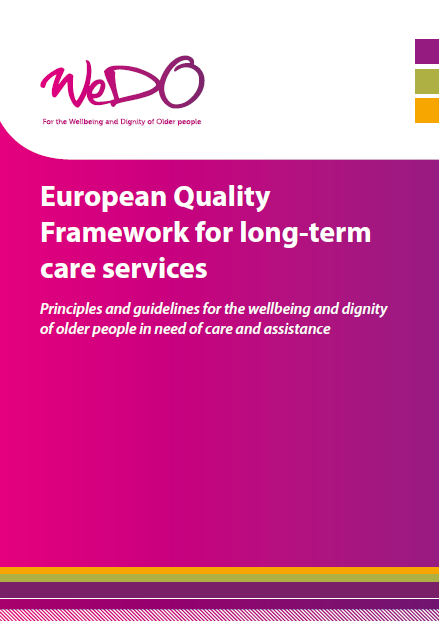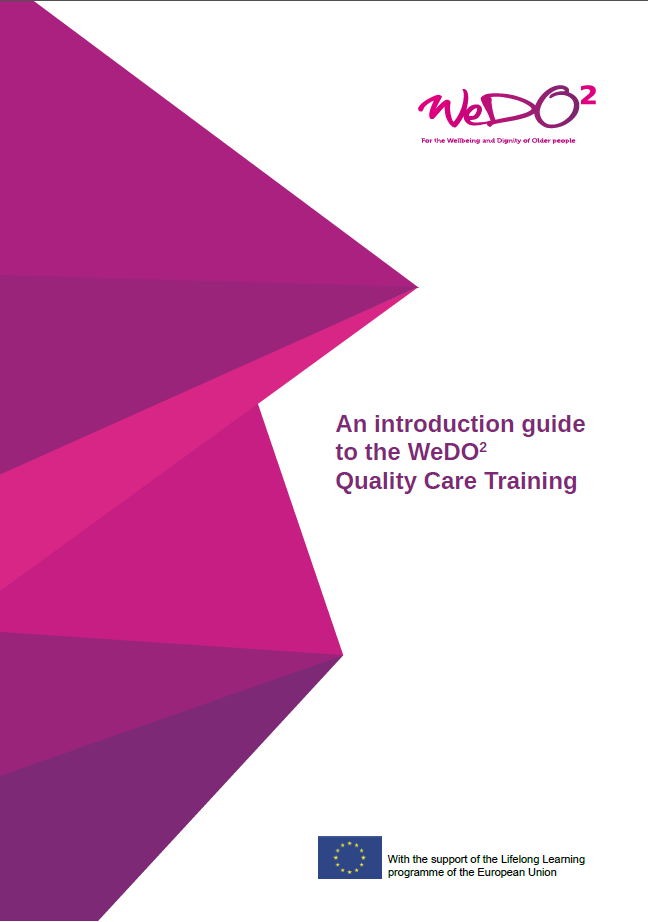Vlaams Ouderenraad Fotobank
PART 4 - Wellbeing and dignity for older persons in need of care: a toolbox
A wide range of tools and solutions are available and part of them are shared here to show both that it is possible to adopt a rights-based approach to care and that there exist concrete ideas and even already concrete tools that policy makers and practitioners can use to move forward.
In particular, this part summarizes a package of tools developed by AGE Platform Europe together with more than 200 organisations in Europe from 2008 to 2015. These tools are complementary and all aim to raise awareness on a common vision and enforce in practice the rights of older persons in need of care and improve quality of care.
All these projects’ results were used to influence the various instruments described in Part 1 and 2: the Council of Europe recommendation on the rights of older persons, the UN processes and most of the EU ongoing activities in the field. These projects have influenced legislation or practice in 15 EU Member States, as shown in the map hereafter.
4.1 The European Charter for the rights and responsibilities of older people in need of care and assistance

The EUSTaCEA project (2008-2010 funded by the Daphne programme) developed a European Charter for the rights and responsibilities of older people in need of care and assistance. The Charter aims to clarify what are the rights of older people in need of care, and increase understanding of older people as rights holders, including among older persons themselves. It emphasizes the fact that a lack of autonomy does not mean a loss of rights :
“As you grow older and may come to depend on others for support and care, you continue to have the right to…”
It includes 10 articles, 9 rights and one article on responsibilities:
- Art. 1: Right to dignity, physical and mental well-being, freedom and security
- Art. 2: Right to self-determination
- Art.3: Right to privacy
- Art. 4: Right to high quality and tailored care
- Art. 5: Right to personalized information, advice and consent
- Art. 6: Right to continued communication, participation in society and cultural activity
- Art. 7: Right to freedom of expression and freedom of thought/conscience: beliefs, culture and religion
- Art. 8: Right to palliative care and support, and respect and dignity in dying and in death
- Art. 9: Right to redress
- Art. 10: Your responsibilities
It is translated into Catalan, Czech, Dutch, English, French, German, Greek, Italian, Polish, Romanian, Slovenian, Spanish, Swedish, and you can fing it here.
This Charter is supported by an ‘Accompanying guide’ addressing each of the rights expressed in the Charter, explaining what they concretely mean and how they can be enforced.
The guide contains: testimonies from older people, recommendations to different groups of people and professionals (policy makers, informal carers, service providers, older people themselves) as well as examples for good practices. It also provides a checklist.
For more information:
- The full text of the Charter and its accompanying guide can be downloaded on AGE Platform Europe website.
4.2 The European Quality framework for long-term care services

The WeDO project (2010-2012 funded by the Directorate-General for Employment, Social Affairs and Inclusion of the European Commission) is based on the Charter and created a European partnership for the wellbeing and dignity of older people. The project involved more than 200 organisations in 12 countries in Europe, including public authorities, service providers and organisations of older people.
Together they reflected on what quality of services means, and drafted a European Quality Framework for long-term care. The framework was developed thanks to a multi-stakeholders participatory approach.
The quality framework is based on quality principles (what a quality service is) and areas of action (what a quality service should contribute to).
- Respectful of human rights and dignity
- Person-centred
- Preventive and rehabilitative
- Available
- Accessible
- Affordable
- Comprehensive
- Continuous
- Outcome-oriented and evidence based
- Transparent
- Gender and culture sensitive
- Preventing and fighting elder abuse and neglect
- Ensuring good working conditions and working environment and investing in human capital
- Empowering older people in need of care and create opportunities for participation
- Developing adequate physical infrastructure
- Developing a partnership approach
- Developing a system of good governance
- Developing an adequate communication and awareness-raising
The Quality framework is available in English, English (version for Ireland), French, German, Italian, Dutch (version for Netherlands), Dutch (version for Belgium), Swedish, Finnish, Slovene, Czech, Greek, Spanish (translation and edition done on a volunteer basis by FATEC) and Polish (translation on a volunteer basis by the Foundation for Women's issues in Poland).
For more information:
- The full version of the Quality framework in all languages is available here.
4.3 The Quality care training package

From 2013 to 2015, a partnership of organisations called WeDO2 made a step further by developing a European Quality care training package.
This package aims to inform people (including care professionals, volunteers, policy makers and younger generations) on the Charter and on WeDO, and foster reflections on what ‘good care’ concretely means.
The WeDO documents are available in 14 languages and used in 15 countries of the European Union.
Access the training package :
4.4 Enforcing the Charter and WeDO in the different European countries:
Note: to see the information, click on the country and the information will appear at the left of the map.



